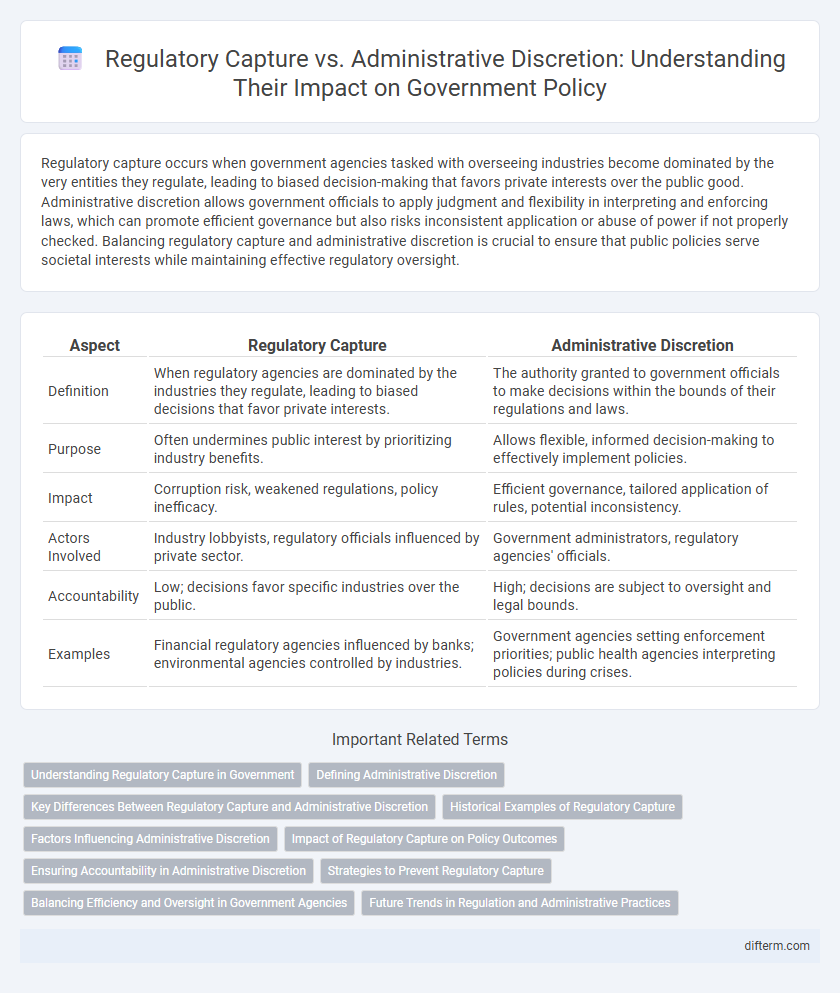Regulatory capture occurs when government agencies tasked with overseeing industries become dominated by the very entities they regulate, leading to biased decision-making that favors private interests over the public good. Administrative discretion allows government officials to apply judgment and flexibility in interpreting and enforcing laws, which can promote efficient governance but also risks inconsistent application or abuse of power if not properly checked. Balancing regulatory capture and administrative discretion is crucial to ensure that public policies serve societal interests while maintaining effective regulatory oversight.
Table of Comparison
| Aspect | Regulatory Capture | Administrative Discretion |
|---|---|---|
| Definition | When regulatory agencies are dominated by the industries they regulate, leading to biased decisions that favor private interests. | The authority granted to government officials to make decisions within the bounds of their regulations and laws. |
| Purpose | Often undermines public interest by prioritizing industry benefits. | Allows flexible, informed decision-making to effectively implement policies. |
| Impact | Corruption risk, weakened regulations, policy inefficacy. | Efficient governance, tailored application of rules, potential inconsistency. |
| Actors Involved | Industry lobbyists, regulatory officials influenced by private sector. | Government administrators, regulatory agencies' officials. |
| Accountability | Low; decisions favor specific industries over the public. | High; decisions are subject to oversight and legal bounds. |
| Examples | Financial regulatory agencies influenced by banks; environmental agencies controlled by industries. | Government agencies setting enforcement priorities; public health agencies interpreting policies during crises. |
Understanding Regulatory Capture in Government
Regulatory capture occurs when government regulators prioritize the interests of the industries they oversee rather than the public, compromising regulatory effectiveness. This phenomenon undermines public trust, enabling firms to influence policy and enforcement through lobbying, revolving doors, and regulatory agencies' reliance on industry expertise. Understanding regulatory capture is essential for implementing safeguards that promote transparency, accountability, and impartial decision-making within government institutions.
Defining Administrative Discretion
Administrative discretion refers to the authority granted to government agencies and officials to interpret and implement laws and policies within the scope of their regulatory framework. It allows flexibility in decision-making to address complex or unforeseen issues while adhering to legislative intent. This discretion is essential for effective governance but requires safeguards to prevent regulatory capture, where agencies prioritize private interests over public welfare.
Key Differences Between Regulatory Capture and Administrative Discretion
Regulatory capture occurs when regulatory agencies are dominated by the industries they are supposed to regulate, leading to decisions that favor industry interests over public welfare. Administrative discretion refers to the flexibility government officials have in interpreting and implementing laws and policies within the boundaries set by legislation. The key difference lies in regulatory capture undermining regulatory objectives through undue influence, while administrative discretion allows for adaptive governance and policy enforcement.
Historical Examples of Regulatory Capture
Regulatory capture occurs when government agencies tasked with regulating industries become dominated by the interests they regulate, often leading to policies favoring businesses over public welfare. Historical examples include the Interstate Commerce Commission (ICC) in the early 20th century, which was heavily influenced by railroad companies, and the Minerals Management Service before the Deepwater Horizon oil spill, where close ties to oil companies compromised regulatory effectiveness. These cases demonstrate how regulatory capture undermines administrative discretion and weakens government oversight.
Factors Influencing Administrative Discretion
Factors influencing administrative discretion include the complexity of laws, the ambiguity in statutory mandates, and the level of expertise possessed by government officials. Political pressures, organizational culture, and resource availability also shape how discretion is exercised within regulatory agencies. These elements determine the balance between rigid rule enforcement and flexible decision-making, impacting regulatory effectiveness and potential for regulatory capture.
Impact of Regulatory Capture on Policy Outcomes
Regulatory capture occurs when regulatory agencies prioritize the interests of the industries they oversee, leading to policy decisions that favor corporate goals over public welfare. This phenomenon distorts policy outcomes by reducing regulatory effectiveness, increasing regulatory leniency, and undermining public trust in government institutions. As a result, policies may fail to address critical issues such as consumer protection, environmental standards, and market competition.
Ensuring Accountability in Administrative Discretion
Ensuring accountability in administrative discretion involves implementing robust oversight mechanisms such as independent review boards and transparent reporting requirements to prevent regulatory capture, where agencies prioritize industry interests over public good. Clear guidelines and ethical standards help delineate the boundaries of discretionary power, reducing arbitrary decision-making and promoting fairness. Strengthening public participation and audit trails further fortify accountability by enabling continuous evaluation of administrative actions against regulatory objectives.
Strategies to Prevent Regulatory Capture
Effective strategies to prevent regulatory capture include enforcing strict conflict-of-interest rules, ensuring transparency through public disclosure of lobbying activities, and rotating regulatory personnel to avoid close ties with industry stakeholders. Implementing independent oversight bodies and promoting stakeholder diversity in decision-making processes also minimize the risk of regulators being unduly influenced by the entities they oversee. These approaches help maintain regulatory integrity and uphold public trust in government institutions.
Balancing Efficiency and Oversight in Government Agencies
Regulatory capture occurs when government agencies prioritize industry interests, undermining impartial oversight and reducing public trust. Administrative discretion enables agencies to efficiently interpret and implement laws but requires robust accountability mechanisms to prevent abuse. Balancing efficiency with oversight demands transparent decision-making frameworks and independent review bodies to safeguard against regulatory capture while maintaining effective governance.
Future Trends in Regulation and Administrative Practices
Emerging trends in regulation emphasize balancing administrative discretion with safeguards against regulatory capture to ensure transparent and accountable governance. Advances in technology and data analytics enable regulators to make informed decisions while mitigating undue influence from industry stakeholders. Strengthening institutional frameworks and promoting stakeholder participation are critical for adaptive and resilient regulatory systems in the future.
Regulatory Capture vs Administrative Discretion Infographic

 difterm.com
difterm.com